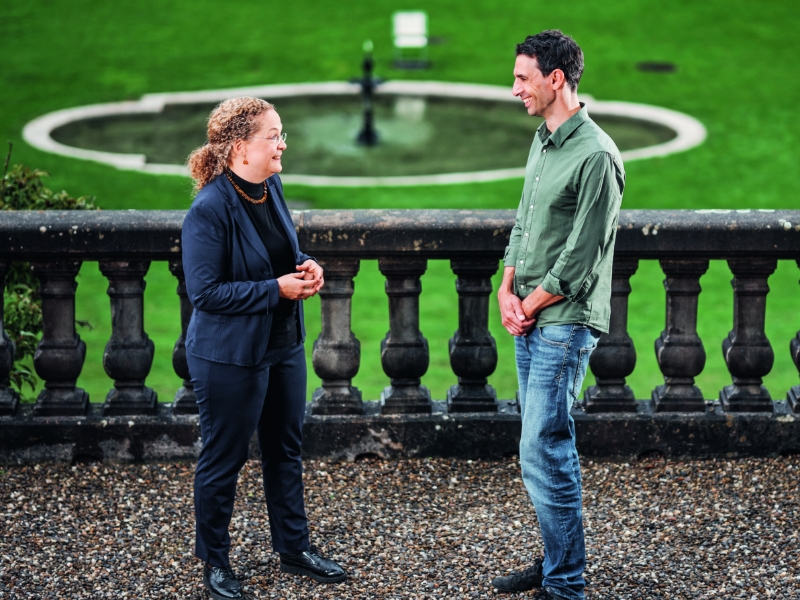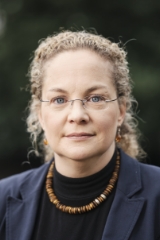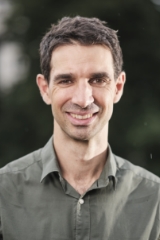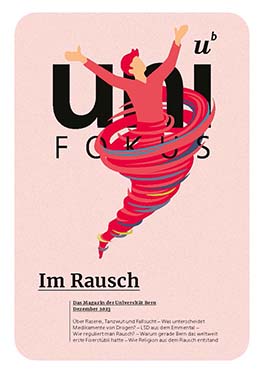In focus
Neither ban nor laissez-faire: how to regulate intoxication?
The way society deals with intoxicants remains challenging. Lawyer Franziska Sprecher and physician Reto Auer, who conduct research on the subject at the University of Bern and advise policymakers, assess current developments.

Franziska Sprecher: I was still a child and, of course, had a completely different view of the subject than I do today. We saw the open drug scene as children, we asked what it was. The adults told us not to touch the syringes you would find lying around, AIDS was an issue, even at school. We also developed an awareness, however, that it wasn’t that these people were bad, but that they were addicts. This is something that can be discussed with children or young people at a relatively early age.
How did you experience it, Mr Auer?Reto Auer: When I was a teenager, I smoked pot on a regular basis. It was the period of my life when I probably needed the police most, because I had a habit of getting myself into violent situations . But the dealers were our friends, the police our enemies – I had learned to be afraid of the police. That’s really sad. At that time, science had also been consulted on the subject of authorizing the ban on cannabis. Today, more attention is being paid to other facts and results that actually existed back then but did not receive any great attention.
Did the experience you had back then also shape you? Is that perhaps why you are in the professional field you work in today?Auer: I don’t think that’s a reason, but I think it’s important to acknowledge your own experience – also to recognize that other people have had different experiences.
Sprecher: That’s hardly the reason why I joined the “law department” and now spend most of my time dealing with health law. When it comes to addiction – and in general when it comes to health – I think it’s important to involve children and young people. If I think back to my own experiences in childhood and adolescence, I realize that you have certain experiences and recognize connections at a relatively young age.
About the person

Franziska Sprecher
is associate professor of constitutional and administrative law with a special focus on health law at the Institute of Public Law at the University of Bern. She is also Director of the Center for Health Law and Health Care Management (MiG) at the University of Bern.
Sprecher: I believe it created social pressure. The problem became visible to everyone, whether it made you feel helpless and insecure, or because of the moving fates of the young people who were dying. You couldn’t just sit back and do nothing, you couldn’t carry on as before, you had to develop new solutions.
So what exactly has changed?Sprecher: People have moved away from pure repression, from a purely police perspective, towards “these people have an addiction”.
Auer: At that time, there was not only the open drug scene, but also an enormous public and obvious problem with tobacco and alcohol. When I was in high school, more than half of the young people smoked, and I also started smoking at the age of 14. That was quite normal, there was advertising everywhere. But then people also started to think again about alcohol and tobacco: It began to be seen as a health problem that caused great damage.
Subscribe to the uniAKTUELL newsletter

Discover stories about the research at the University of Bern and the people behind it.
Auer: Nine thousand deaths a year in Switzerland, the majority of smokers who are ill: It eventually got to the point where it was no longer possible to disguise the consequences of tobacco. In the 1950s, the problem was not as obvious and was deliberately kept quiet by the industry for a long time, but at some point people realized that tobacco was not just another product.
Sprecher: I think the knowledge came gradually until the facts could no longer be denied. Then things started to get rolling in individual cantons until stricter regulations were introduced at federal level: That was the end of smoking in restaurants, on trains, at colleges…
Auer: The referendum in February 2022 marked a turning point when, after many unsuccessful attempts, a clear majority approved the popular initiative “Yes to protecting children and young people from tobacco advertising”.
Back to the open drug scene: in Western Switzerland, but also in Zurich, we now have situations that we have not seen since the 1990s. What’s going on right now?Auer: I’m not an expert here, but every substance comes with its own challenges. Researchers at Sucht Schweiz, an organization dedicated to addiction counseling, recently published a research paper on the situation in Geneva. The decisive factor was that a very well-organized group of dealers had devised a sophisticated strategy for boosting consumption: They launched ready-made crack balls that are very easy and quick to consume and, in particular, much cheaper. In the case of such new challenges, science comes into play in order to understand the background and also to work on the experiences of other countries from which we may learn.
You are both members of the Swiss Federal Commission on Addiction and Prevention of Noncommunicable Diseases (EKSN). Is this Commission also a response to emerging drug use?Sprecher: No. It’s true that with the new forms of crack consumption, the problem of addiction is once again becoming more visible in the public sphere. The fact is, however, that new substances and new dosage forms are constantly being launched on the market. Sometimes they have an immediate effect, as is the case with crack now. When it comes to other substances, society does not even notice that they are there. It’s a never-ending race: On the one hand, there are specialists, from the healthcare sector to the police and academia – and also regulations through laws or easier-to-modify annexes to ordinances that list which substances are banned. On the other hand, there is the market, which creatively exploits the gaps. In this race, all we can do is keep up and develop good solutions if everyone involved works together in an interdisciplinary way. The EKSN wants to contribute to this.
Until recently, the prevailing public opinion was that, in the 1990s, the internationally acclaimed Swiss drug policy got the drug problem under control once and for all. Listening to you, it sounds more of a constant balancing act behind the scenes, which requires a lot of effort.Sprecher: Yes, and this also applies to legal substances, such as authorized medicines that are not used for their intended purpose. Take cough syrup for instance, what are pharmacies still allowed to dispense and how? This needs to be constantly adapted.
In the USA, the dispensing of painkillers has gone completely out of control. How in Switzerland do we deal with the balancing act of relieving patients who are suffering from pain without triggering an addiction crisis?Auer: The situation in the USA is very sad, lots of people have replaced painkillers with heroin and fentanyl, the social misery is enormous, many are dying. To understand what has happened here, we need independent research. We should look at this epidemic in a differentiated way. The common interpretation is that industry and doctors are responsible for all of this because they promote and prescribe the products. But that was perhaps only part of the problem. There are also other explanations. For example, the financial crisis from 2008 onwards triggered enormous social misery, especially at the heart of the USA, which promotes problematic consumption and addiction. If you look at who has developed problematic consumption, it is often the lower middle class, especially white men. The social outlook for these people in the United States has become very gloomy. Physicians in the US are also required to stop prescribing opiates as soon as they suspect there is any form of dependency. If addicts use an alternative, such as fentanyl, in the street without supervision and support after such a prescription stop, they fall through the social net, are stigmatized and chased by the police. It is therefore very important that there are specialists in Switzerland who analyze exactly what is happening in the US and who ask themselves whether we have a similar situation, and then consider what approaches are appropriate for the situation in Switzerland.
About the person

Reto Auer
is associate professor and head of the substance use office at the Bern Institute of Primary Health Care (BIHAM) at the University of Bern. He also works as a family doctor in a group practice in Bern.
Sprecher: With my specialist knowledge, I work there as a lawyer. During discussions, for example, I can point out where there are limits from a legal perspective or how we can legally support something. Everyone contributes their expertise to the discussion, but we don’t just stick to our own traditional discipline; instead we work together to find solutions.
Auer: The current commission is an amalgamation of three commissions that have dealt separately with addiction, alcohol and tobacco prevention and that have all done a great deal of groundwork over many years. Now, everyone in the new commission recognizes that no one should focus only on “their” issue – I think this is a good way of approaching things.
What exactly do you mean by that?Auer: For example: Experts in so-called “hard” drugs have found that a criminalization of the drug market leads to major social and health damage. So they’re looking for ways to simplify distribution to addicts. Tobacco prevention experts, on the other hand, see the insufficiently regulated market and marketing of tobacco as a problem. They would never cooperate with the tobacco industry and instead try to restrict supply and demand. So experts with such different approaches didn’t understand each other at first. That’s what I like most about commissions like this: We learn from each other.
How’s that?Auer: When it comes to cannabis, for example, it is common knowledge that controlled, legal and accompanied dispensing may be the right solution for people who are highly addicted or have problematic use. In other words, solutions similar to those we are familiar with from the regulated dispensing of opioids. At the same time, 80% do not have problematic consumption. The EKSN recommends making cannabis available under strict control, but not promoting it. Because if you let the market run wild to ensure the illegal market disappears as quickly as possible by making cheap cannabis available everywhere and using advertising, more people will start using cannabis. According to the EKSN, this means that the focus should be on public health and safety. Recommendations include: no advertising, non-profit-oriented sales exclusively to adults, regulating sales outlets. In other words, solutions that are well known from tobacco prevention. It is always about finding ways to reduce social and health damage as much as possible.
Sprecher: It is important to emphasize that a commission such as the EKSN does not make decisions. It can analyze, inform and advise – but ultimately, how to deal with these substances is a political decision.
The regulation of addictive substances is far from logical today – wine, for example, is exempt from alcohol tax. Is there a need for a coherent regulatory model for all psychoactive substances?Sprecher: The whole thing has evolved over time – it’s no coincidence that we also have to deal with legal history. Regulations and laws are not created in an ivory tower; cultural ideas and tangible interests play a major role. Let’s take alcohol and its economic aspects: Jobs are linked to it, it’s a tradition, it’s a Swiss cultural asset. This must be taken into account when proposing a regulatory model. And even if a draft law were to be reasonably coherent across all substances, adjustments would be made in the political process. Health is only one interest among many. Finding a balance here is the job of politics.
“Health is just one interest among many. Finding the balance is the job of politics.”
Franziska Sprecher
Perhaps we can discuss this with a current example. As part of the SCRIPT study, the first pilot trials of legal cannabis use are now starting.Auer: This project at the universities of Bern and Lucerne arose because several cities, including Bern, had a problem with cannabis. The situation is difficult for the city authorities: Cannabis is banned, but people still use and sell it – it is not feasible to enforce the ban. This means that some authorities would actually need new legislation. Pilot trials allow us, as researchers, to test different regulatory models. This also required an amendment to the Narcotics Act, the so-called experimentation article.
What exactly is happening now?Auer: This winter, consumers will be able to register in the cities of Bern and Biel, and later in Lucerne as well. After a first visit, half of the people can get cannabis in pharmacies, the other half are assigned to the control group, which has to wait another six months. After six months, we will be able to thoroughly compare and analyze the health and social impacts between the two groups. Then everyone will be allowed to obtain cannabis for two years. One of the special qualifications in the study is that people stop smoking – i.e. do not smoke joints or cigarettes.
You’re not supposed to smoke the cannabis?Auer: No. We have seen in other countries that vapes, i.e. e-joints, are increasing in popularity. This is a new form of consumption that we don’t know much about yet.
Why should they stop smoking?Auer: Studies we have carried out ourselves and those of other researchers show that it is not cannabis that destroys the lungs and causes heart disease, but tobacco in both cases. Until now, it has been very difficult for people who use cannabis to get away from tobacco.
Are the people taking part in the study open to new forms of consumption?Auer: Basically, yes. We work with an advisory group in which cannabis users are also represented and contribute their perspectives. For example, I would have thought that there was no need for hashish, different flowers with different concentrations would suffice – but they wanted a high-quality cannabis resin on offer. With the pilot tests, we now have the opportunity to test different forms of consumption and their effects. The plan is to make both cannabis e-joints and cannabis mouth sprays available. The results could be useful for the authorities to regulate these alternative forms of consumption.
Why this cautious approach?Auer: Because then you have indications of what effects are to be expected. We also learn from other countries. In the US state of Colorado, for example, there was a referendum, and all of a sudden, cannabis products were available everywhere, advertised – with the possible consequence of increasing use and children ending up in the emergency department because of cannabis gummy bears. In SCRIPT, we refer to the opinion of the EKSN and other organizations that recommend the “start low, go slow” approach.
With the hemp shops that flourished around the turn of the millennium, we’ve already had a situation in Switzerland that got out of hand.Auer: Yes, and you can currently see how quickly new products are launched and marketed in the CBD market. By dispensing cannabis in pharmacies, we are now deliberately testing a very limited model. The SCRIPT study focuses on the protection of minors and not necessarily on combating the illegal market. If you want to fight the illegal market, you have to sell a substance everywhere, allow advertising and make it cheap.
“By dispensing cannabis in pharmacies, we are now deliberately testing a very limited model.”
Reto Auer
These are conflicting goals. So you can’t solve all your problems with one model?Auer: We test with a focus on health and the protection of minors – other experiments have a different approach. Internationally, there are different models that we follow closely. We hope that the results of SCRIPT will provide the public and policy makers with a basis for discussion to decide which is the best solution for Switzerland.
Sprecher: You have to realize that this is an enormous development. If we look back ten or fifteen years, there was only a strict ban. Developments in the field of the medical use of cannabis have set things in motion. This has paved the way for these experiments to become possible. Experimental legislation is also relatively new for the legal sciences – and also for parliament, which has taken this path with the experimentation article.
Auer: At the same time, there are those who feel it is taking far too long to implement pilot projects. For example, the committees of the National Council and the Council of States have already approved the parliamentary initiative of National Councilor Heinz Siegenthaler for a “regulation of the cannabis market for better protection of young people and consumers”.
Sprecher: Yes, the legislation is already under way before the pilot test has even begun. This is the difficulty of processes running in parallel, and we have to be careful that they do not run against each other. But this can only be controlled to a limited extent.
What could happen next? Could the historically developed, incoherent regulation in the area of addiction lead to better solutions?Sprecher: In the case of cannabis, it does look like that at the moment. However, it is important to remember that cannabis is one of many substances. Addiction is infinitely wide. We haven’t even talked about all the behavioral addictions – for example, in the area of social media or shopping addiction – that’s another problem. We have good developments in cannabis now, but we have a lot of areas that are not even noticed by society and politics. We are not in the process of finding a solution to the problem of addiction in society.
In conclusion: How do you personally deal with the topic of intoxication, perhaps also with your children? What applies in your home when it comes to intoxication, potentially addictive substances and also media?Sprecher: I believe that intoxication is part of life and we have a great responsibility when it comes to children. It is important to talk to them about drugs, intoxication and addiction in general, not just ban them, which is counterproductive. There are good books for young children. As parents, we should support young people closely, listen, never close our eyes, pay attention and be there for them.
Auer: My children are now 5 and 8 years old. It is our responsibility as adults to provide the next generation with an environment that does not declare problematic use normal and even “cool” as was the case with tobacco in my youth.
Magazine uniFOKUS

Subscribe free of charge now!
This article first appeared in uniFOKUS, the University of Bern print magazine. Four times a year, uniFOKUS focuses on one specialist area from different points of view.